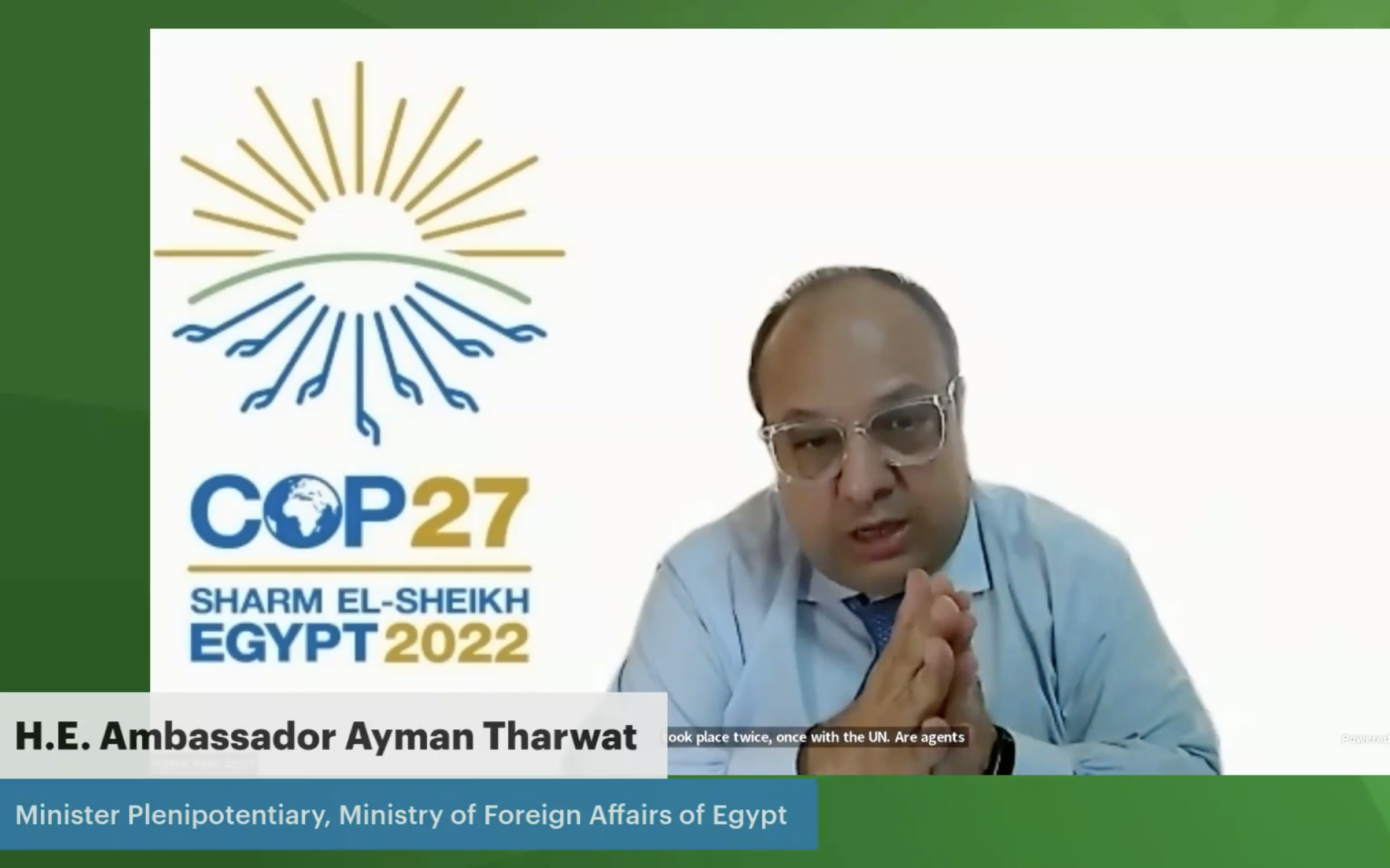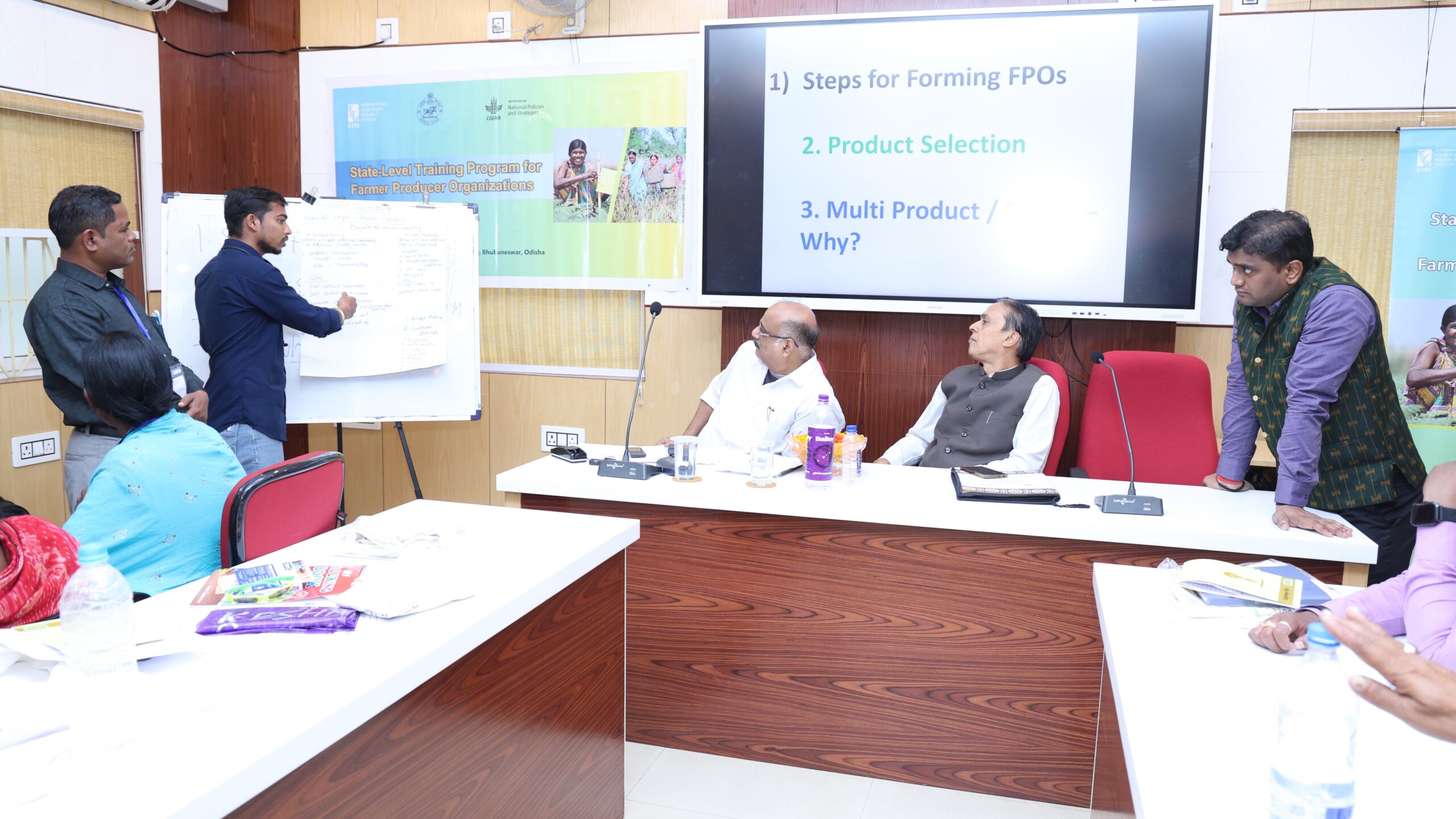One of the several side-events CGIAR organized as part of this year’s World Food Prize Borlaug Dialogue was dedicated to Egypt’s plans for growing the climate resilience of agriculture and food systems in its role as host and presidency of the UN climate talks in Sharm El-Sheikh (COP27, Nov. 6-18), as well as the role CGIAR is playing in them. The Oct. 20 virtual seminar, convened by IFPRI, the International Center for Agricultural Research in the Dry Areas (ICARDA), and CGIAR’s National Policies and Strategies Initiative, examined the climate change challenges Egypt’s agrifood sector is facing and how the focus on climate c in the new CGIAR research portfolio can help increase climate resilience in Egypt and beyond.
In his opening remarks, Michael Baum, Deputy Director General, ICARDA, gave an overview of the new CGIAR research initiatives on climate change, as well as CGIAR’s active role in and plans for COP27, including the official Food and Agriculture Pavilion hosted by the United Nations Food and Agriculture Organization (FAO), CGIAR, and The Rockefeller Foundation. Baum also spoke about direct engagement of CGIAR with the Egyptian COP27 Presidency.
Ayman Tharwat, Ambassador and Minister Plenipotentiary, Egyptian Ministry of Foreign Affairs, presented the country’s COP27 plans and priorities related to food and agriculture. There are two agendas concerning agriculture in COP27, he said. The formal agenda is related to the Koronivia Joint Work on Agriculture (KJWA), a landmark decision launched during COP23 in 2017, which recognizes the unique potential of agriculture in tackling climate change. The 2022 conference is “bringing the KJWA family together” to pave the way for the “implementation of agricultural modalities we would like to see at the end of the COP27,” Tharwat said; and “on the informal agenda, there are several Egyptian Presidency-led initiatives that will be launched during COP27, and it is great to see some good synergies with the CGIAR initiatives.”
Tharwat also emphasized the neutral stance of Egypt’s COP27 Presidency and its desire to build consensus among the parties during COP27. Egypt, he stated, is determined not only to facilitate agreements but also to explore means of implementation and financing them: “Our aim is to act as a bridge between the global North and the global South, and to keep the momentum going from COP27 to the next COP to be hosted by the United Arab Emirates.”
Claudia Ringler, Deputy Director, Environment and Production Technology Division, IFPRI, presented IFPRI research on climate change related challenges facing Egypt’s food systems. This work informs the keen interest of this year’s COP Presidency in identifying and streamlining climate action to support local and regional food systems. “Egypt already has a hot desert climate with almost no rain and has, nonetheless, developed a thriving agriculture sector” said Ringler, “but “climate change impacts, in particular from water, heat and salinity stress, will place high costs on the country’s agriculture sector,” she noted.
Juan Lucas Restrepo, CGIAR Global Director for Partnerships and Advocacy, outlined critical outcomes CGIAR would like to see emerging from COP27. He emphasized in particular the need for a call to develop a framework for metrics to better measure and monitor progress toward a global goal on adaptation, stating that indicators exist on the mitigation side, but not yet for adaptation. Restrepo also highlighted the urgent need to increase finance for adaption needs for vulnerable countries and populations.
Food systems both contribute to and are negatively affected by climate change, said Andrew Jarvis, Associate Director-General for Research, Strategy and Innovation at The Alliance of Bioversity International and CIAT. Jarvis provided an overview of the CGIAR Research Portfolio, which prioritizes innovative solutions to address climate change challenges facing food systems.
In a panel discussion that followed, Aditi Mukherji, Principal Researcher, International Water Management Institute (IWMI), and Director, CGIAR Climate Change Adaptation and Mitigation Impact Area Platform, explained the critical role water plays in adaptation and mitigation of climate change. While water is a “victim of climate change,” Mukherji said, research shows that over 60% of documented adaptation strategies are related to water, and those solutions bring about positive outcomes in several dimensions including economic, livelihoods, and productivity benefits. But adaptation becomes less effective with more warming, that is why it is so critical to keep the 1.5°C target. If we go beyond that, all current investments in adaptation may be less effective. The good news is that combining multiple adaptation and mitigation efforts, creating “a whole basket of technologies” increases their cumulative effectiveness in the long run, concluded Mukherji.
Kathleen Kirsch, Climate Integration Lead, Office of Economic Growth, USAID/Egypt, addressed USAID’s approach to climate change and dealing with the adaptation and mitigation challenges. “We are prioritizing water, water management systems, and early warning systems. We also think that resilience and food security components are key,” said Kirsch.
Reem Abdel Meguid, Chairperson of the Board of Trustees of the Association for Sustainable Quality of Living (Estidama) and Lead of the Africa Grows Green Initiative, emphasized that climate change is intensifying food insecurity across Africa. She also highlighted the role of entrepreneurs and innovators in facilitating climate change adaptation and mitigation on the continent.
During the Q&A session, the online audience raised questions about how the Egyptian Presidency was steering the COP negotiations during these challenging times of energy and food price hikes, increasingly devastating impacts of climate change, and a tense geopolitical situation in Europe and other parts of the world. Ambassador Tharwat stressed the need to turn pledges into actions and scale up funding for adaptation, particularly in the water and agriculture sectors. In line with that, another online participant noted that while the food crisis is felt in many parts of the world, it is particularly severe in countries in conflict zones, where more people suffer from hunger or malnutrition and where climate change adds to the severity of the problem.
All panelists and speakers agreed that there is yet much to be done, and real investments, needed to increase climate resilience in Egypt, on the African continent, and beyond. CGIAR and the Egyptian Presidency aim to support the implementation of proven climate resilience strategies in agriculture and food systems to address multiple, interlocked current crisis for a more climate-resilient future.
Contributors: Ali Abdelhadi, Senior Communications Specialist based in IFPRI’s office in Cairo; Roula Madjalani, ICARDA Climate Advisor; Claudia Ringler, Deputy Director of IFPRI’s Environment and Production Technology Division. This post also appears on the IFPRI-Egypt blog.







